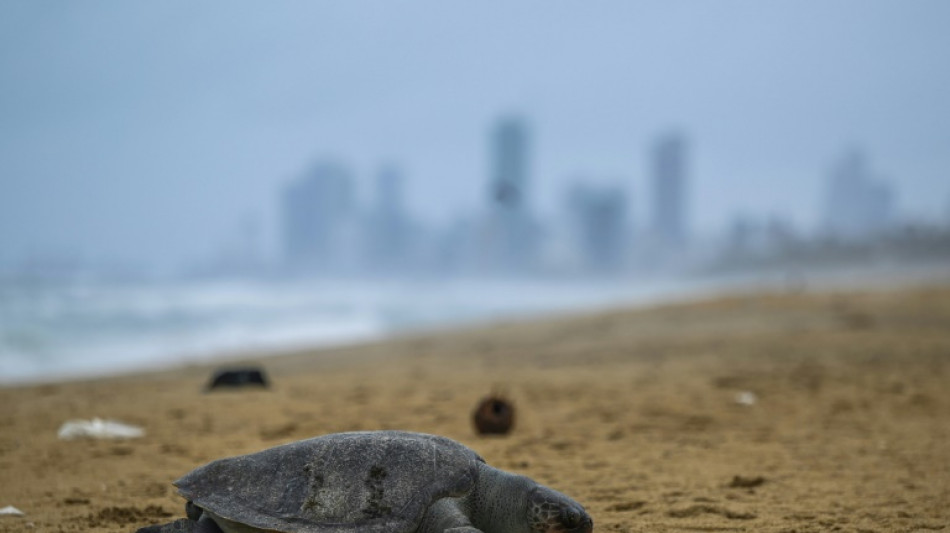
-
 Japan PM's tax giveaway roils markets and worries voters
Japan PM's tax giveaway roils markets and worries voters
-
Amid Ukraine war fallout, fearful Chechen women seek escape route

-
 Rybakina surges into Melbourne semis as Djokovic takes centre stage
Rybakina surges into Melbourne semis as Djokovic takes centre stage
-
Dollar struggles to recover from losses after Trump comments

-
 Greenland blues to Delhi red carpet: EU finds solace in India
Greenland blues to Delhi red carpet: EU finds solace in India
-
Will the EU ban social media for children in 2026?

-
 Netherlands faces 'test case' climate verdict over Caribbean island
Netherlands faces 'test case' climate verdict over Caribbean island
-
Rybakina stuns Swiatek to reach Australian Open semi-finals

-
 US ouster of Maduro nightmare scenario for Kim: N. Korean ex-diplomat
US ouster of Maduro nightmare scenario for Kim: N. Korean ex-diplomat
-
Svitolina credits mental health break for reaching Melbourne semis

-
 Japan's Olympic ice icons inspire new skating generation
Japan's Olympic ice icons inspire new skating generation
-
Safe nowhere: massacre at Mexico football field sows despair

-
 North Korea to soon unveil 'next-stage' nuclear plans, Kim says
North Korea to soon unveil 'next-stage' nuclear plans, Kim says
-
French ex-senator found guilty of drugging lawmaker

-
 US Fed set to pause rate cuts as it defies Trump pressure
US Fed set to pause rate cuts as it defies Trump pressure
-
Sleeping with one eye open: Venezuelans reel from US strikes

-
 Venezuela's acting president says US unfreezing sanctioned funds
Venezuela's acting president says US unfreezing sanctioned funds
-
KPop Demon Hunters star to open Women's Asian Cup

-
 Trump warns of 'bad things' if Republicans lose midterms
Trump warns of 'bad things' if Republicans lose midterms
-
Russian strikes in Ukraine kill 12, target passenger train

-
 With Maduro gone, Venezuelan opposition figure gets back to work
With Maduro gone, Venezuelan opposition figure gets back to work
-
Celebrities call for action against US immigration raids

-
 Rubio to warn Venezuela leader of Maduro's fate if defiant
Rubio to warn Venezuela leader of Maduro's fate if defiant
-
Denver QB Nix 'predisposed' to ankle injury says coach

-
 Lula, Macron push for stronger UN to face Trump 'Board of Peace'
Lula, Macron push for stronger UN to face Trump 'Board of Peace'
-
Prass stunner helps Hoffenheim go third, Leipzig held at Pauli

-
 Swiss Meillard wins final giant slalom before Olympics
Swiss Meillard wins final giant slalom before Olympics
-
CERN chief upbeat on funding for new particle collider

-
 Trump warns US to end support for Iraq if Maliki returns
Trump warns US to end support for Iraq if Maliki returns
-
Judge reopens sexual assault case against goth rocker Marilyn Manson

-
 South Korea's ex-first lady to learn verdict in corruption case
South Korea's ex-first lady to learn verdict in corruption case
-
Rosenior dismisses Chelsea exit for 'untouchable' Palmer

-
 Markram powers South Africa to win over West Indies
Markram powers South Africa to win over West Indies
-
Vladimir Padrino: Venezuela's military power broker

-
 Amazon closing Fresh and Go stores in Whole Foods push
Amazon closing Fresh and Go stores in Whole Foods push
-
Koepka nervous about game and fans in PGA Tour return

-
 Trump's Iowa trip on economy overshadowed by immigration row
Trump's Iowa trip on economy overshadowed by immigration row
-
Dortmund coach says Inter Milan are improved under Chivu

-
 US border chief in Minneapolis as Trump tries to calm crisis
US border chief in Minneapolis as Trump tries to calm crisis
-
What to know about America's colossal winter storm

-
 Iran warns against 'instability' after US strike group arrives
Iran warns against 'instability' after US strike group arrives
-
GM reports quarterly loss but boosts shareholder returns

-
 US banks fight crypto's push into Main Street
US banks fight crypto's push into Main Street
-
NFL Bills make offensive coordinator Brady new head coach

-
 TikTok settles hours before landmark social media addiction trial
TikTok settles hours before landmark social media addiction trial
-
Newcastle braced for 'ultimate test' against PSG after storm disruption

-
 Brook blitz ends Sri Lanka's unbeaten home run, England clinch series
Brook blitz ends Sri Lanka's unbeaten home run, England clinch series
-
LVMH 2025 net profit drops 13% to 10.9 bn euros

-
 Philip Glass pulls Kennedy Center premiere after Trump takeover
Philip Glass pulls Kennedy Center premiere after Trump takeover
-
Slot says Liverpool must fix 'very bad cocktail'


Over 21% of reptile species at risk of extinction
At least one in five reptile species are threatened with extinction, including more than half of turtles and crocodiles, according to the first major global assessment of the world's so-called cold-blooded creatures.
Catastrophic declines in biodiversity across the world are increasingly seen as a threat to life on Earth -- and as important as the interrelated menace of climate change.
Threats to other creatures have been well documented. More than 40 percent of amphibians, 25 percent of mammals and 13 percent of birds could face extinction.
But until now, researchers did not have a comprehensive picture of the proportion of reptiles at risk.
In a new global assessment, published in the journal Nature, researchers assessed 10,196 reptile species and evaluated them using criteria from the International Union for Conservation of Nature (IUCN) Red List of threatened species.
They found that at least 1,829 -- 21 percent -- were either vulnerable, endangered or critically endangered.
"It's just overwhelming the number of species that we see as being threatened," said co-author Neil Cox, who manages of the IUCN-Conservation International Biodiversity Assessment Unit and co-led the study.
"Now we know the threats facing each reptile species, the global community can take the next step by joining conservation plans with global policy agreement and invest in turning around the often too under-appreciated and severe biodiversity crisis."
Crocodiles and turtles were found to be among the most at-risk species, with around 58 percent and 50 percent found to be under threat respectively.
Cox said this was often down to "over-exploitation and persecution".
Crocodiles are killed for their meat and to remove them from human settlements, he said, while turtles are targeted by the pet trade and used for traditional medicine.
- 'Furry, feathery' focus -
Another well-known species at risk is the fearsome king cobra, the world's largest venomous snake. It can grow to around five metres long, feasting on other snakes in forests across a huge area from India to Southeast Asia.
It has been classified as vulnerable, indicating it is "very close to extinction", Cox said at a press briefing on the research.
"It's a real iconic species in Asia and it's such a shame that even widespread species such as this are really suffering and in decline," he said, adding that logging and deliberate attacks by humans were among the biggest threats to the snake.
Bruce Young, chief Zoologist at NatureServe, who co-led the study, said threatened reptiles were largely found concentrated in Southeast Asia, Western Africa, northern Madagascar, the Northern Andes and the Caribbean.
The researchers found reptiles restricted to arid habitats such as deserts, grasslands, and savannas "are significantly less threatened" than those in forest habitats, he explained.
Agriculture, logging, invasive species and urban development were found to be among the threats to reptiles, while people also target them for the pet trade or kill them for food or out of fear.
Climate change was found to pose a direct threat to some 10 percent of reptile species, although researchers said that was likely an underestimate.
The researchers were surprised to find that conservation aimed at other creatures had also benefited reptiles to an extent, although they stressed that the study highlights the need for specific urgent conservation for some reptiles.
Young said the reptile assessment, which involved hundreds of scientists from across the world, took around 15 years to complete and was hampered by a lack of funding.
"Reptiles, to many people, are not charismatic. And there's just been a lot more focus on some of the more furry or feathery species of vertebrates for conservation," he said.
Researchers said they hope the new assessment will help spur international action to halt biodiversity loss.
W.Lapointe--BTB




